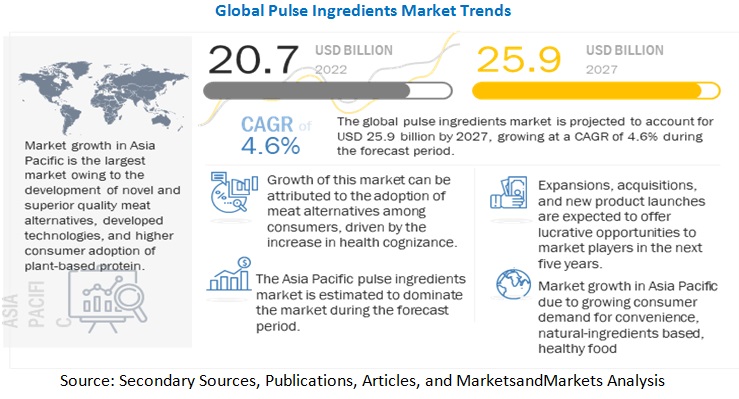
The global pulse ingredients market is estimated to be valued at USD 20.7 billion in 2022. It is projected to reach USD 25.9 billion by 2027, recording a CAGR of 4.6% during the forecast period.
The key players in this market include ADM (US), Roquette Frères (France), Ingredion (US), The Scoular Company (US), Axiom Foods, Inc., (US), PURIS (US), Emsland Group (Germany), AGT Food and Ingredients (Canada), Batory Foods (US), Vestkron Milling M/S (Norway), and Dakota Ingredients (US).
Pulse ingredients are fine-powdered materials created from the peas, lentils, and chickpeas made without the use of processing aids or chemical compounds. These are natural food and feed-grade products that are used to increase the nutritional value of foods without altering flavor, aroma, and color properties. Pulse ingredients are important components of food ingredients used in feed products including pet foods and aquaculture. The demand for protein-rich food products is very high and is a growing trend among consumers; moreover, the popularity of protein-rich food is particularly higher among diet-conscious consumers and those dealing with weight management. Pulses, being a rich source of proteins, has driven the market for pulse-derived protein. There is a growing trend of consumers demanding plant proteins as ingredients in foods; moreover, animal-sourced protein is expensive to consume, and thus, the demand has shifted to alternate protein-rich food products that are sourced from plants.
Download PDF brochure: https://www.marketsandmarkets.com/pdfdownloadNew.asp?id=246427813
Chickpeas or garbanzo beans are a good source of proteins, vitamins, minerals, carbohydrates, and include high levels of dietary fiber. According to Food and Agriculture Organization (FAO), in 2019, India was the largest producer of chickpeas with about 70% supply coming from the country. It is the third largest produced legume in South Asia after bean and pea. Desi and Kabuli are two distinct types of cultivated chickpea; the Kabuli is grown in West Asia and the Mediterranean region, whereas the desi type is grown in the Indian subcontinent. Increased consumption of chicpea and use in various food and beverage application to drive the market for the segment.
The Asia Pacific market consists of developing countries such as India, China, Australia & New Zealand, and Japan. According to FAO, in 2018, the region accounted 49% of the global pulse production within which India contributed around 57% of the production alone. The country is one of the major pulses producing as well as consuming country in the world. The major pulse crops in India include chickpeas, peas, green gram, black gram and lentils. The regional growth is backed by the rising population, growth in disposable income, and increased consumer interest toward functional ingredients, which is expected to boost the sales of pulse ingredients.